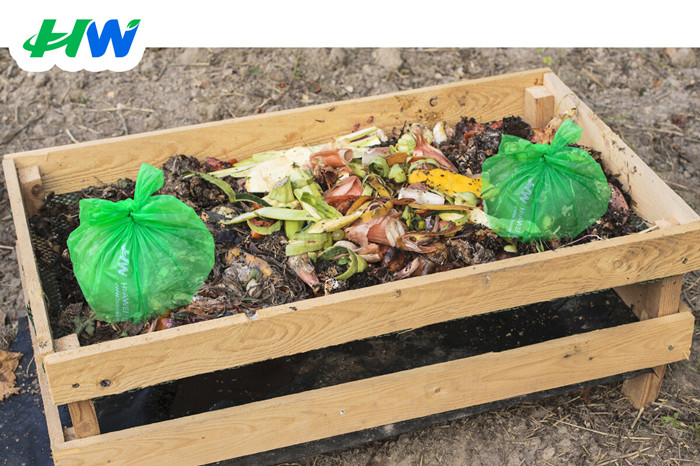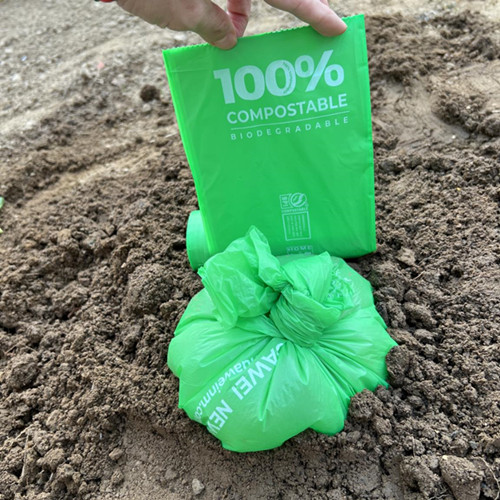
Compostable plastics belong to the category of biodegradable plastics. Compostable Plastics (Compostable Plastics) refers to plastics in the composting conditions, through the role of microorganisms, can be converted into carbon dioxide, water and its elements contained in mineralized inorganic salts and new biomass within a certain period of time, and the final formation of the compost in the heavy metal content, toxicity tests, residual debris, etc. should be in line with the provisions of the relevant standards. Compostable plastics can be further divided into industrial compost and garden compost, which are now available in the market.
Because compostable plastics belong to biodegradation under conditions. If compostable plastics are casually discarded in the natural environment, these plastics degrade very slowly in the natural environment (e.g. seawater, soil) and do not completely degrade into carbon dioxide and water, etc. in a short period of time, and their adverse impact on the environment is not substantially different from that of traditional plastics.
With the increasing awareness of environmental protection, biodegradable and compostable plastic bags have gradually become the focus of attention. Biodegradable plastic bags are plastic bags that can be decomposed by microorganisms during use. This kind of plastic bag has the advantages of environmental protection and sustainability, but there are also some disadvantages. In this paper, the advantages and disadvantages of degradable plastic bags will be discussed in depth.

1. Convenient collection of food waste
Compostable plastic bags help in segregating and collecting bio-waste and also recycle the food scraps attached to the packaging along with the food scraps that would be discarded if the packaging is sifted out of the waste stream. They also reduce the contamination of compost from traditional plastics, reduce moisture content and increase expansion, which is useful when composting food waste.
2. Beneficial for industrial and home composting
The value of industrial compostable plastics (certified according to the harmonized European standard EN 13432) is that they can be used as an additional waste disposal option through organic recycling and provide a more efficient method of separate collection of household food waste. The best example of this is compostable plastics in Italy, where compostable packaging is widely supported and used.In 2018, the separate household food waste recycling rate reached 80%.
3. favoring the reduction of microplastics
By improving the separate collection of organic waste, industrial compostable plastics also help to reduce the contamination of biowaste with conventional plastics and ultimately reduce microplastics in fossil-based polymers in compost. Because biodegradable polymers do not break down into permanent secondary microplastics when they degrade, microorganisms capable of metabolizing these polymers exist in most natural environments. Therefore, biodegradable plastics help minimize environmental impacts and reduce the accumulation of microplastic particles in different environments.
4. Biodegradable mulch does not accumulate in the soil
Soil biodegradable mulches are a good example of the industrial use of biodegradable plastics. They have been on the market for many years and play a vital role in modern agriculture as they help increase yields, improve crop quality, enhance weed control and reduce water irrigation and pesticides. Compared to conventional (PE) plastic mulch, soil biodegradable mulch fully biodegrades in less than two years and does not accumulate in the soil. The advantages over conventional mulch have also been recognized by the United Nations. Soil health is also protected by a strict certification process. The European standard EN 17033 sets out clear requirements for the biodegradation of mulch used in agriculture and horticulture.
5. Contributing to carbon reduction
When developing the new soil health law, the European Commission should also consider that organic recycling generates carbon sinks. Some of the carbon stored in biowaste converted to compost through organic recycling can be converted to a very stable form and retained in the soil for decades. As industrial compostable plastics help to feed more biowaste into organic recycling, they help to create carbon sinks and contribute to CO2 reduction.
1. Higher cost At present, the production cost of biodegradable plastic bags is still relatively high. Although the production cost is gradually decreasing, it is still much higher than the production cost of traditional plastic bags. This limits the large-scale production and application of degradable plastic bags to a certain extent.
2. Degradation conditions, part of the degradable plastic bag degradation conditions are also relatively strict. Although degradable plastic bags can decompose in the natural environment, they require certain conditions such as humidity, temperature and microorganisms. In certain extreme environments, such as dry or cold places, degradable plastic bags may not be able to completely and quickly degrade.
3. Performance Compared with traditional plastic bags, the performance of degradable plastic bags may be slightly reduced. For example, in terms of strength, durability and transparency, degradable plastic bags may not be as good as traditional plastic bags. Therefore, attention needs to be paid to the conditions and manner of use during the process.
